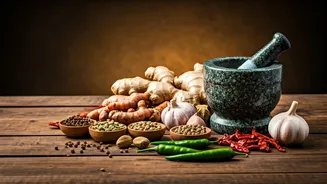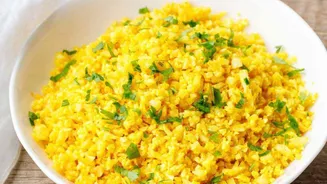Embrace Freshness
The first cornerstone of tribal cooking is a profound respect for freshness. Ingredients are sourced locally, often directly from the wild or nearby farms,
ensuring peak flavor and nutritional value. The emphasis is on seasonal eating, utilizing whatever is available in abundance at a given time. This not only guarantees the freshest produce but also promotes a diverse and balanced diet. Consider how this contrasts with modern convenience, where food travels long distances and may lose nutrients and flavor in transit. The tribal way underscores the importance of connecting with the source of your food and appreciating its natural state. This approach minimizes the need for preservatives and processing, making for a healthier and more sustainable way of life. This means less reliance on processed goods and a deeper appreciation for the true taste of food.
Master Simple Methods
Simplicity is key in tribal cooking. Traditional methods like slow cooking, grilling over an open fire, and minimal processing are favored. These techniques enhance the natural flavors of the ingredients and retain their nutritional value. The focus is on letting the food speak for itself, with minimal interference from complex spices or techniques. The use of simple tools like earthen pots and wooden spoons further reflects the close connection with nature. This contrasts sharply with modern kitchens filled with gadgets; tribal cooking emphasizes the importance of patience and the satisfaction of creating delicious meals with minimal effort. This approach not only makes cooking more accessible but also encourages a deeper understanding and appreciation of the ingredients.
Celebrate Local Spices
Tribal cuisines leverage a vibrant array of local spices, carefully selected for their flavor and medicinal properties. These spices are often grown in the immediate vicinity, ensuring both freshness and a unique regional character. The use of spices is not merely about adding flavor; it's also about enhancing the nutritional value of the food and promoting overall well-being. This contrasts with the sometimes excessive use of pre-mixed spice blends in modern cooking, which may contain unnecessary additives. By focusing on locally sourced and freshly ground spices, tribal cooks create meals that are both delicious and beneficial for health. The careful selection and use of spices are a testament to the knowledge and wisdom passed down through generations, showcasing a deep understanding of the natural world and its gifts.
Prioritize Whole Grains
The cornerstone of many tribal diets is the consumption of whole grains, such as millets, sorghum, and various types of rice. These grains are chosen for their high fiber content, which promotes digestive health and provides sustained energy. Unlike refined grains, whole grains retain their natural nutrients, making them a more wholesome option. The tribal way of life also encourages a variety of grains, ensuring a balanced intake of different nutrients. This stands in stark contrast to the modern preference for processed grains. The focus on whole grains demonstrates a deep understanding of the nutritional needs of the body and a commitment to consuming foods in their most natural state. This approach supports a healthier lifestyle and minimizes the risk of lifestyle-related ailments.
Use Traditional Fats
Tribal cooks typically use traditional fats like ghee (clarified butter) and various types of seed oils. These fats are often produced locally and are chosen for their flavor and nutritional properties. Ghee, in particular, has been a staple in Indian cuisine for centuries, known for its digestive benefits and ability to enhance the flavors of dishes. These fats are used with moderation, and the emphasis is always on balance. The careful selection of fats helps to create balanced meals that provide the body with essential nutrients. This contrasts with modern diets, where processed fats are often overused. Tribal practices underscore the importance of choosing fats wisely, valuing natural sources and the careful balance they bring to the diet.
Respect Food Waste
Minimizing food waste is integral to tribal cooking. Every part of the ingredients is used whenever possible, including vegetable peels and animal parts. This practice reflects a deep respect for the natural resources and a commitment to sustainability. Any leftovers are carefully stored and repurposed to avoid discarding. This contrasts with the wastefulness often seen in modern kitchens, where significant amounts of food are discarded. Tribal cooks are resourceful, always finding creative ways to utilize every component of their ingredients. This approach not only minimizes waste but also enhances the flavor and nutritional value of meals. This practice emphasizes a respect for the land and the bounty it provides.
Share Meals Together
Tribal cuisine frequently involves communal meals, with food prepared and enjoyed together. This practice strengthens social bonds and fosters a sense of community. The preparation of food becomes a shared experience, with everyone contributing. Meals are eaten slowly, allowing time to savor the flavors and engage in conversation. This is in stark contrast to the hurried meals often consumed in modern life. The emphasis on shared meals underscores the importance of connection and the joy of breaking bread together. This practice promotes a deeper appreciation for food, community, and the simple pleasures of life, highlighting the social and cultural significance of meals.












